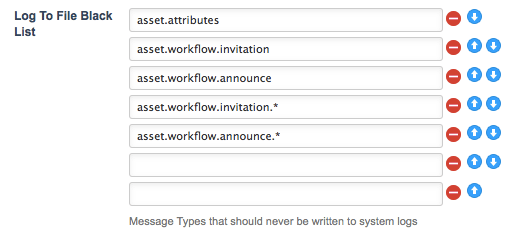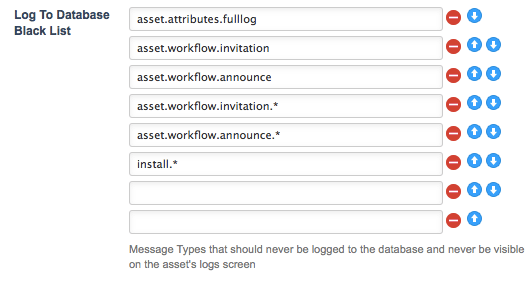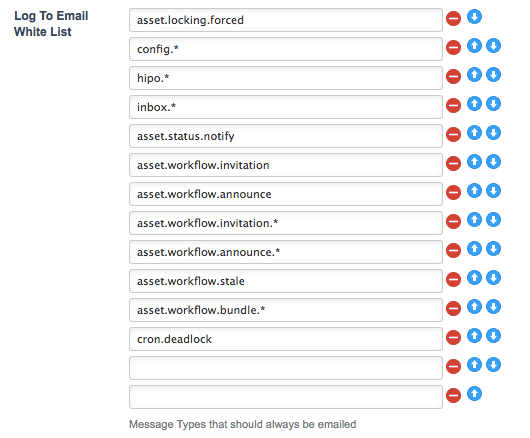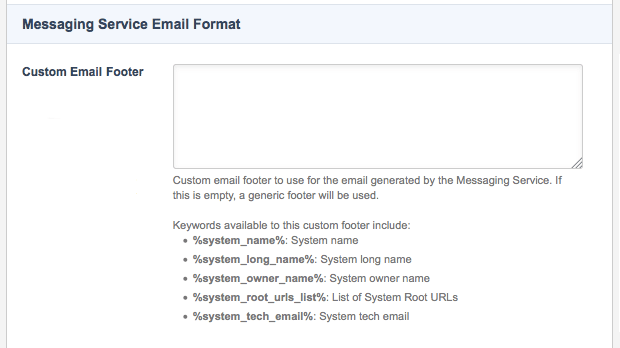Messaging service configuration
The Messaging service configuration screen allows you to edit the internal message settings of the system, including which messages are logged to the database and which messages are sent through email.
A list of all internal messages that are available is provided in the Internal message types section.
Messaging service configuration
To access the Messaging service configuration screen:
-
click on the
icon in the top right-hand corner of the screen; a drop-down list will appear under this icon.
-
Select Messaging service configuration; the screen will appear.
The available fields are outlined below:
- Log to file allow list
-
This field is shown in the figure below.

This field allows you to specify the internal messages that will be written to the system log file. The default value is
*, meaning that all internal messages will be logged. If you only want to log specific messages, remove the*and add them to this field. - Log to file block list
-
This field is shown in the figure below.

This field allows you to specify the internal messages that will not be written to the system log file. By default, the internal messages that will not be logged include asset.attributes, asset.workflow.invitation, asset.workflow.announce, asset.workflow.invitation.* and asset.workflow.announce.*.
More information about these internal messages is in the Internal message types section.
- Log to database allow list
-
This field is shown in the figure below.

This field allows you to specify the internal messages written to the database and shown on the Logs screen of an asset. The default value is
*, meaning that all internal messages will be logged to the database. If you only want to log specific messages, remove the*and add them to this field. - Log to database block list
-
This field is shown in the figure below.

This field allows you to specify the internal messages that will not be written to the database and are not shown on the Logs screen of an asset.
By default, the internal messages that will not be logged include asset.attributes.fulllog, asset.workflow.invitation, asset.workflow.announce.*, asset.workflow.invitation.*, asset.workflow.announce.* and install.*.
More information about these internal messages is in the Internal message types section.
- Log to email allow list
-
This field is shown in the figure below.

This field allows you to specify the internal messages that will be emailed to users. By default, the internal messages that will be emailed include asset.locking.forced, config.*, hipo.*, inbox.*, asset.status.notify, asset.workflow.invitation, asset.workflow.announce, asset.workflow.invitation.*, asset.workflow.announce.*, asset.workflow.stale and cron.deadlock.
More information about these internal messages is in the Internal message types section.
- Log to email block list
-
This field is shown in the figure below.

This field allows you to specify the internal message that will not be emailed to users. This field is blank by default.
Messaging service email format
Emails sent by Squiz Content Management’s messaging service contain an email footer that, by default, specifies the details of the system being run, including its version number and system root URLs.
This is an automated message from Example System Name running Squiz Content Management 6.0.0
System root URLs :
Www.example.squiz.net
Contact (admin@squiz.com.au) for support.The messaging service email format section allows you to customize this footer information for emails sent by your system. The fields available in this section are shown in the figure below.

In the custom email footer field, enter the content you want to use as the footer for emails sent by Squiz Content Management’s messaging service. The following keyword replacements can be used in this field to display the information of your system within the email footer:
-
%system_name% -
%system_long_name% -
%system_owner_name% -
%system_root_urls_list% -
%system_tech_email%
Internal message types
Below is a table outlining the internal messages that are available for the system.
It includes the code for the message and the information logged to either the system log file, the database, or sent in the email. The information uses keyword replacements and will substitute the keyword with information from the asset that caused the internal message.
| Message | Code | Information that is logged |
|---|---|---|
Asset created |
asset |
New |
Asset attribute changed |
asset.attributes |
The value of attribute |
Asset attribute changed |
asset.attributes.fulllog |
The value of attribute |
Asset attribute changed |
asset.attributes.fulllog.scalar |
The value of attribute |
Asset attribute changed |
asset.attributes.scalar |
The value of attribute |
Asset date changed |
asset.dates |
The |
Asset link created |
asset.linking.create |
|
Asset link deleted |
asset.linking.delete |
|
Asset link locked status updated |
asset.linking.locked |
The link |
Asset link sort order updated |
asset.linking.order |
The sort order of link |
Asset link type updated |
asset.linking.type |
The type of link |
Asset link value updated |
asset.linking.value |
The value on link |
Asset lock forcibly acquired |
asset.locking.forced |
User |
Asset lookups updated |
asset.lookups.updated |
Asset |
Asset metadata schema removed |
asset.metadata.schema.delete.fulllog |
The metadata schema |
Asset metadata schema applied |
asset.metadata.schema.set.fulllog |
The metadata schema |
Asset metadata field updated |
asset.metadata.set.fulllog |
The metadata field |
Asset permission deleted |
asset.permissions.delete |
|
Asset permission set |
asset.permissions.deny |
|
Asset permission set |
asset.permissions.grant |
|
Broken link(s) found in |
asset.report.brokenlink |
A broken |
Asset status changed |
asset.status |
The status of |
Asset made live |
asset.status.notify |
|
Asset changes approved |
asset.workflow.announce.approve |
User |
Workflow escalated |
asset.workflow.announce.escalated |
Asset |
Asset changes rejected |
asset.workflow.announce.reject |
User |
Workflow started |
asset.workflow.announce.started |
User |
Asset changes approved |
asset.workflow.bundle.announce.approve |
User |
Asset changes rejected |
asset.workflow.bundle.announce.reject |
User |
Workflow approval required |
asset.workflow.bundle.invitation |
The bundle |
Workflow approval required |
asset.workflow.bundle.invitation.progress |
The bundle |
Workflow approval required |
asset.workflow.bundle.started |
The bundle |
Workflow completed |
asset.workflow.complete |
The workflow process for |
Workflow approval required |
asset.workflow.invitation |
|
Workflow approval required |
asset.workflow.invitation.progress |
|
Asset changes approved |
asset.workflow.log.approve |
User |
Asset workflow completed |
asset.workflow.log.complete |
The workflow process for |
Workflow escalated |
asset.workflow.log.escalated |
Asset |
Asset changes rejected |
asset.workflow.log.reject |
User |
Asset up for review |
asset.workflow.log.review |
User |
Asset review cancelled |
asset.workflow.log.review.cancel |
User |
Review complete |
asset.workflow.log.review.complete |
The review process for |
Asset safe edit cancelled |
asset.workflow.log.safeedit.cancel |
User |
Workflow started |
asset.workflow.log.started |
User |
Asset up for review |
asset.workflow.review |
User |
Asset review cancelled |
asset.workflow.review.cancel |
User |
Stale workflow step |
asset.workflow.stale |
Asset |
Workflow user log |
asset.workflow.userlog |
|
Bulkmail job cancelled |
bulkmail.job.cancelled |
Job was cancelled by |
Bulkmail job completed |
bulkmail.job.completed |
Mail successfully sent to |
Bulkmail job completed with error |
bulkmail.job.completed.error |
Mail successfully sent to |
Bulkmail job completed with error |
bulkmail.job.completed.error+filtered |
Mail successfully sent to |
Bulkmail job completed, some filtered |
bulkmail.job.completed.filtered |
Mail successfully sent to |
Bulkmail test mode |
bulkmail.job.testmode |
Mail request for |
Bulkmail test mode completed |
bulkmail.job.testmode.completed |
Bulkmail test mode was completed.mail was requested for |
Bulkmail previewed |
bulkmail.preview |
|
External tools config updated |
config.external_tools_config |
|
HIPO config updated |
config.hipo_config |
|
Messaging service config updated |
config.messaging_service_config |
|
Password rules config updated |
config.password_rules_config |
|
Proxy authentication config updated |
config.proxy_authentication_config |
|
Squiz server config updated |
config.squiz_server_config |
|
System config updated |
config.system_config |
|
Potential scheduled jobs manager dead lock issue |
cron.deadlock |
The scheduled jobs manager for the system |
Forced failure of |
cron.forced_fail |
The job |
|
cron.job.error |
Error messages :
|
|
cron.job.fail |
Error messages :
|
Another instance of |
cron.job.startfail |
The job |
|
cron.job.success |
Error messages :
|
|
cron.job.success.incomplete |
Error messages :
|
TERMINATION of |
cron.job.term |
The job |
Safe trash warning: |
cron.safetrash.notify.children |
You have administrator access to the asset |
Safe trash warning: |
cron.safetrash.notify.links |
You have administrator access to the asset |
Safe trash warning: |
cron.safetrash.notify.status |
You have administrator access to the asset |
Termination of cron manager |
cron.term |
The scheduled jobs manager for the system |
HIPO herder |
hipo.force_kill |
Force kill |
HIPO herder |
hipo.orphan_kill |
Orphan kill |
|
inbox.message |
|
|
inbox.sent |
|
Install |
install.asset_type.uninstall |
UNINSTALLED the following asset types as they are no longer recognised by any package:
|
Install |
install.authentication |
|
Install |
install.event_listeners |
Event listeners done. |
Install |
install.package.deferred |
|
Install |
install.package.fail |
|
Install |
install.package.success |
|
Install |
install.package.uninstall |
Uninstalled |
Install |
install.prefs |
Global preferences done. |
Install |
install.system_assets.fail |
|
Install |
install.system_assets.success |
|
Global preferences updated |
prefs.system |
|
Purge squid cache |
purge.squid.cache |
|
Security alert |
system.security.alert |
Possible attempt to steal session detected! |
User account locked |
system.security.locked |
User |
User logged in |
system.security.login |
User |
User login failed |
system.security.login.failed |
User |
User account access warning |
system.security.login.ldap |
Ldap user |
User logged in as secondary user |
system.security.login.secondary |
User |
User secondary login failed |
system.security.login.secondary.failed |
Login to user account |
User automatically logged out |
system.security.logout.idle |
User |
User automatically logged out |
system.security.logout.ip_change |
User |
User logged out |
system.security.logout.manual |
User |
User logged out secondary user |
system.security.logout.secondary.manual |
User |
User automatically logged out |
system.security.logout.staleauth |
User |
Trigger execution failure |
trigger.invalid |
INVALID (Trigger components could not be loaded)
Trigger |
Trigger execution success |
trigger.success |
SUCCESS
Trigger |